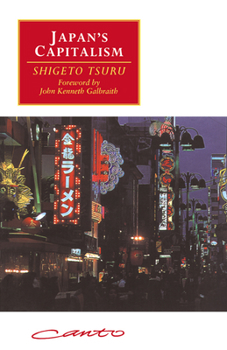Japan's Capitalism: Creative Defeat and Beyond
Select Format
Select Condition 
Book Overview
Japan's economic reconstruction after total defeat in the Second World War has been an extraordinary phenomenon. In Japan's Capitalism, Shigetu Tsuru, one of Japan's most eminent economists gives a comprehensive account of the recovery process, and a unique interpretation of the post-war Japanese economy. He analyses the significance of Japan's money-oriented affluence and the emergence of a distinctive 'corporate capitalism'. His conclusion is that Japan's inspired creative response to defeat has itself led to a new set of intractable problems.
Format:Paperback
Language:English
ISBN:0521576210
ISBN13:9780521576215
Release Date:July 1996
Publisher:Cambridge University Press
Length:292 Pages
Weight:1.70 lbs.
Dimensions:0.9" x 8.5" x 5.3"
Customer Reviews
1 rating
an insider's view of japan's post-war economy
Published by Thriftbooks.com User , 25 years ago
Among the many (usually lengthy) works on the subject of Japan's post-war economy, this slim (pp277) volume is outstanding. The well-connected, Harvard-educated Tsuru was intimately involved in many of the landmark events described, especially the shaping of economic policy during the Occupation years. Throughout this lively and original analysis of economic policy-making and its political contexts, he provides an invaluable insider's view. Tsuru's socialist sympathies mean he is not just another capitalist apologist, ready to overlook the social costs of Japan's high-speed growth, but neither is he an ideologue unable to recognise the achievements. His approach is humane, often refreshingly personal, and anchored by a profound knowledge of his subject. There are insights throughout, such as the way the credit squeeze imposed in 1949-50 by Joseph Dodge helped revive the zaibatsu, by knocking out their competition, at a time when declared US policy was the elimination of the old corporate cartels. Anyone interested in understanding how Japan's economy took off and where it might be headed now should read this book.





